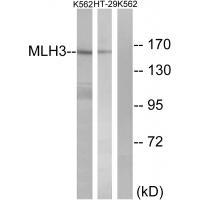
| WB | 咨询技术 | Human,Mouse,Rat |
| IF | 咨询技术 | Human,Mouse,Rat |
| IHC | 咨询技术 | Human,Mouse,Rat |
| ICC | 技术咨询 | Human,Mouse,Rat |
| FCM | 咨询技术 | Human,Mouse,Rat |
| Elisa | 咨询技术 | Human,Mouse,Rat |
| Aliases | DNA mismatch repair protein Mlh3; MutL protein homolog 3; |
| Entrez GeneID | 27030; |
| WB Predicted band size | 164kDa |
| Host/Isotype | Rabbit IgG |
| Antibody Type | Primary antibody |
| Storage | Store at 4°C short term. Aliquot and store at -20°C long term. Avoid freeze/thaw cycles. |
| Species Reactivity | Human |
| Immunogen | Synthesized peptide derived from internal of human MLH3. |
| Formulation | Purified antibody in PBS with 0.05% sodium azide. |
+ +
以下是关于MLH3抗体的3篇参考文献概览(基于公开研究整理):
---
1. **文献名称**:*Germline mutations of the DNA mismatch repair gene MLH3 in patients with hereditary non-polyposis colorectal cancer*
**作者**:Wu Y, et al.
**摘要**:研究利用MLH3抗体进行免疫组化分析,发现携带MLH3生殖细胞突变的林奇综合征患者中,MLH3蛋白表达显著缺失,提示其与结直肠癌遗传易感性相关。
2. **文献名称**:*MLH3 mutations in endometrial cancer*
**作者**:Hienonen T, et al.
**摘要**:通过Western blot和免疫荧光技术结合MLH3抗体,发现子宫内膜癌组织中MLH3蛋白功能异常可能与错配修复缺陷及微卫星不稳定性有关。
3. **文献名称**:*Mlh3 deficiency in mice triggers defects in DNA repair and increased tumor susceptibility*
**作者**:Lipkin SM, et al.
**摘要**:利用MLH3抗体检测基因敲除小鼠模型,证实Mlh3缺失导致DNA修复功能受损,并显著提高淋巴瘤和肠癌发生率,支持其在基因组稳定性中的作用。
---
(注:若需具体文献,建议通过PubMed或学术数据库检索DOI或PMID获取全文。)
×